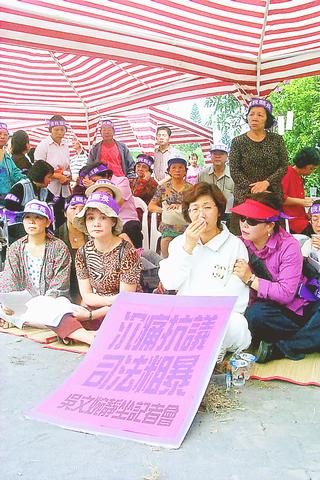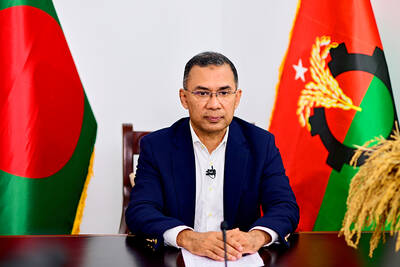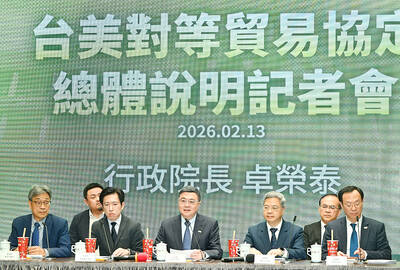The court ruling which ordered Nantou County Commissioner Peng Pai-hsien's (
The prosecution suspects that the 51-year old commissioner of the county worst hit by the devastating 921 earthquake has misappropriated post-quake relief donations and unlawfully manipulated the contracting process for reconstruction projects.
While the truth remains a matter for judicial investigation, to the local communities of Nantou Peng's current troubles are not news and have their origins in his tough personality and governing style, although his supporters and adversaries have different accounts of how these have conspired to cause him trouble.

PHOTO: LU CHANG-PING, TAIPEI TIMES
Withdrawing from the DPP in 1997, Peng -- the three-term legislator who enjoyed a nationwide reputation as a financial and economic professional -- won the election for commissioner as an independent candidate by a tiny margin ahead of KMT and DPP candidates.
After becoming commissioner he soon removed councilors' traditional entitlement to "small construction funds" (
These are a long-standing feature of Taiwan's local politics. To gain support from county councilors, county governments allocate money from their annual budgets to councilors for construction work in their constituencies.
In practice, however, the money often ends up in corrupt councilors' pockets, is used to benefit supporters, or even buy votes. It is, therefore, a much criticized practice.
"Peng is a person with ideals. He has a deep hatred of corruption. His decision to remove unearned profits from some councilors displeased them," said Peng's close aide and secretary, Yang Shun-ming (楊順明).
The County Council Speaker Cheng Wen-tung (鄭文銅), however, disagreed with this assessment.
He said that conflict between the commissioner and the council started when Peng stopped paying salaries to county government officials for several months, in a bid to stress to the central government how financially deprived the county was when he first became commissioner.
"The council disagreed with the drastic measure but he was too persistent with his own ideas," Cheng told the Taipei Times.
He attributed the government-council tension that has existed ever since to Peng's tough and persistent personality. It is for this reason that Peng has been nicknamed "His Majesty" (
The speaker has been a keen political enemy of Peng. The council is apparently divided between the commissioner's faction and the speaker's faction, with the support of 15 and 22 respectively of the total 37 councilors. The factions cut across party lines. Both the commissioner and the speaker have KMT and independent adherents, while all four DPP councilors are considered to be in the KMT speaker's faction.
The "small constructions funds" are just one example of the changes Peng has made to the way public construction projects are contracted. Peng's opponents claim he took total control of almost every project and always awarded the contracts to certain businessmen he favored. His supporters say that is an exaggeration and that integrated planning and contracting were necessary for the sake of efficiency.
Lise Lai (
"There are actually not many companies in Nantou capable of carrying out big, undivided construction projects. Companies which contract for specific parts of construction projects would, of course, complain if there were," she said.
But a county council official, formerly a senior local journalist, said that Peng's big problem is that he sees others as corrupt and only believes in himself and his own small group of aides.
When he became commissioner, Peng brought several previous assistants from the legislature with him to the county government and set up his own "commissioner's office," which was not a part of the institutional machinery of the county.
Many local politicians and county government officials have complained that his eight assistants have too much power over county affairs.
Many of the assistants are ostensibly hired as "temporary employees," filling vacancies at various government departments. But, they have actually worked with Peng at the very center of decision-making, overriding even the heads of government departments.
In addition to relying on personal assistants, allegations of bypassing normal administrative procedure have been made about Peng's use of foundations.
Regarding the ongoing corruption case, the prosecutors have claimed that some NT$30 million of quake relief donations -- which are supposed to be in the government's relief account -- have gone to two private foundations chaired by Peng.
But Peng's camp has a different explanation.
"The New Nantou (
The council had cut the budget of the county government's information department. Peng therefore set up the cable TV channel as the government's official media mouthpiece, using resources from the foundation.
Yang insists the money coming into the foundation had, from the very beginning, nothing to do with quake relief. But prosecutors believe that Peng persuaded some would-be donors to government relief funds into donating money to his foundation instead.
The other foundation in question, the Nantou County Construction and Development Foundation (
According to the rules of the foundation, the incumbent Nantou commissioner must serve as its chairman.
Citing the rules, Yang argued that this was not Peng's foundation and that its funds were nevertheless all spent on post-disaster reconstruction.
But this does not eradicate the possibility that Peng, the incumbent commissioner, could use the money of his own volition.
Councilors have been arguing that Peng used the foundations as a means to avoid supervision by the county council.
"We knew the foundations would cause him trouble," said Tang Huo-sheng (
Although Peng's governance of the county has been highly controversial, his potential for re-election next year has not diminished.
"If he is not convicted, he will still be the most likely winner of the election for commissioner," Tang said. He called Peng a smart politician and the most earnest and hard-working Nantou commissioner ever.
Tang said the three major parties could all field candidates, but Peng was still the most popular politician. This was why, said a council official who declined to be named, Peng was not afraid of falling foul of so many people. "He could win again by catering to less than a mere 30 percent of voters."

PEACE AT LAST? UN experts had warned of threats and attacks ahead of the voting, but after a turbulent period, Bangladesh has seemingly reacted to the result with calm The Bangladesh Nationalist Party (BNP) yesterday celebrated a landslide victory in the first elections held since a deadly 2024 uprising, with party leader Tarique Rahman to become prime minister. Bangladesh Election Commission figures showed that the BNP alliance had won 212 seats, compared with 77 for the Islamist-led Jamaat-e-Islami alliance. The US embassy congratulated Rahman and the BNP for a “historic victory,” while India praised Rahman’s “decisive win” in a significant step after recent rocky relations with Bangladesh. China and Pakistan, which grew closer to Bangladesh since the uprising and the souring of ties with India, where ousted Bangladeshi prime minister Sheikh Hasina

FAST-TRACK: The deal is to be sent to the legislature, but time is of the essence, as Trump had raised tariffs on Seoul when it failed to quickly ratify a similar pact Taiwan and the US on Thursday signed a trade agreement that caps US tariffs on Taiwanese goods at 15 percent and provides preferential market access for US industrial and agricultural exports, including cars, and beef and pork products. The Taiwan-US Agreement on Reciprocal Trade confirms a 15 percent US tariff for Taiwanese goods, and grants Taiwanese semiconductors and related products the most-favorable-treatment under Section 232 of the Trade Expansion Act, the Executive Yuan said. In addition, 2,072 items — representing nearly 20 percent of Taiwan’s total exports to the US — would be exempt from additional tariffs and be subject only to

NON-NEGOTIABLE: The US president’s action ran counter to one of the US’ ‘six assurances’ on not consulting China about arms sales to Taiwan, US lawmakers said US President Donald Trump’s admission that he is discussing arms sales to Taiwan with Chinese President Xi Jinping (習近平) is “alarming and a blatant violation of US policy and the six assurances,” US Representative Ro Khanna said on Tuesday. Trump on Monday said he would decide soon on whether to send more weapons to Taiwan, after Xi warned him not to do so. “I’m talking to him about it. We had a good conversation, and we’ll make a determination pretty soon,” Trump told reporters aboard Air Force One when asked about warnings raised by Beijing during a phone call with Xi over

HOLIDAY RUSH: Airport passenger volume is expected to reach a new high, while southbound road traffic would likely peak from Tuesday As Lunar New Year travelers flock overseas, passenger traffic at Taiwan Taoyuan International Airport is expected to shatter records, as Taoyuan International Airport Corp (TIAC, 桃園國際機場), Taiwan’s largest aviation hub operator, projected yesterday’s passenger volume to climb to 167,000. The figure comes after a record single-day high of 161,000 passengers on Thursday, and would surpass the previous pre-COVID-19 pandemic Lunar New Year peak of 166,000 passengers in 2019, TIAC said. Long lines could be seen forming as early as 7am yesterday, filling Terminal 1 of the airport almost to capacity, yet security checks took only 10 to 15 minutes. TIAC urged